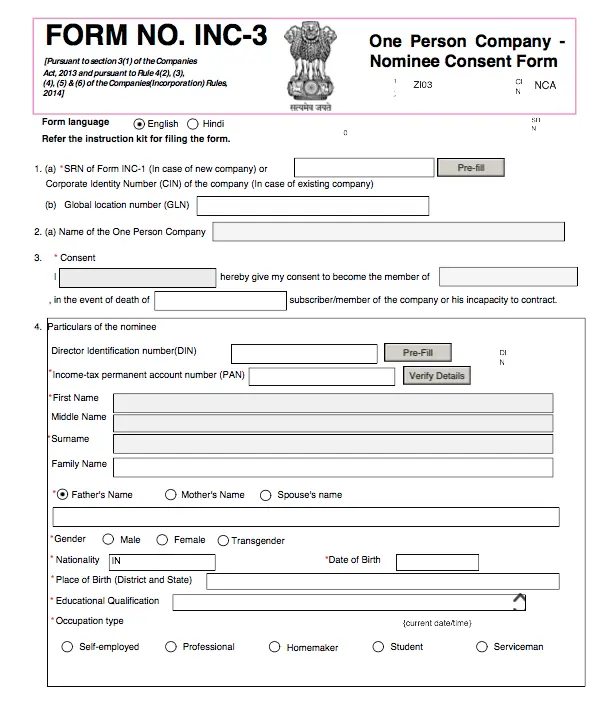
Form INC-3 is the Nominee Consent Form required for registering a One Person Company (OPC) in India. For every OPC registration, submitting Form INC-3 is essential to record the consent of the nominee who will take over the company in case of the sole member’s incapacity or death.
In an OPC, the nominee plays a crucial role in ensuring continuity and legal compliance. Appointed during incorporation, the nominee safeguards the company’s operations and management.
Proper completion of Form INC-3 is mandatory to avoid delays or rejections during OPC registration. This guide shows entrepreneurs when they need it, how to fill it correctly, and which common mistakes to avoid, helping them complete the process confidently.
What is Form INC-3?
Form INC-3 is the Nominee Consent Form. It is mandatory to register a One Person Company (OPC) in India. The form records the nominee’s consent to take over the OPC if the sole member dies or becomes incapable. An OPC cannot be incorporated without a properly filled Form INC-3. It ensures legal compliance and continuity of the company.

Rule 4(2) of the Companies (Incorporation) Rules, 2014, read with Section 3(1)(c) of the Companies Act, 2013, governs Form INC-3.
Who Fills the INC-3 Form?
The nominee appointed by the sole member or promoter of the OPC must complete and sign Form INC-3. The nominee plays a vital role in ensuring the continuity of the company in unforeseen circumstances.
Purpose and Key Declarations in Form INC-3
When submitting the INC-3 Form, the nominee makes several critical declarations to ensure legal validity:
- Consent to become a member: The nominee agrees to become a member of the OPC if the sole member dies or becomes incapacitated.
- Citizenship and residency: The nominee must be an Indian citizen and resident of India.
- Clean legal record: The nominee must not have been convicted of any offences related to promoting or managing a company or LLP in the past five years.
- Single nomination rule: The nominee must not already be nominated in any other OPC.
- Acknowledgment of withdrawal rights: The nominee understands that the person nominating them can withdraw the nomination at any time.
Submitting the Form INC-3 correctly ensures that the OPC remains compliant with the Companies Act and safeguards the interests of both the sole member and the nominee.
What is the Role of a Nominee in an OPC and How Does Form INC-3 Work?
In a One Person Company (OPC), a nominee ensures continuity if the sole member is unable to manage the business. Form INC-3 records the nominee’s consent and details, making their appointment legally valid and compliant under the Companies Act, 2013.
- Ensures Continuity of the Company: The nominee is essentially a successor who assumes the role of the sole member in the event of the original member’s death or incapacity, preventing disruption in company operations.
- Legal Safeguard: By appointing a nominee, the OPC ensures compliance with the Companies Act, 2013, which mandates continuity of management for single-member companies.
- Consent and Declaration: The nominee voluntarily agrees to take over responsibilities and documents this consent in Form INC-3, including personal details and declarations of eligibility.
- Facilitates Transparency: After the Registrar of Companies (ROC) approves Form INC-3, the company adds the nominee’s details to the official master data, maintaining transparency in its records.
What are the Eligibility Criteria for an OPC Nominee?
To qualify as a nominee for a One Person Company (OPC) under the Companies Act, 2013, an individual must meet certain legal and compliance requirements.
- Indian Citizenship and Residency: The nominee must be an Indian citizen and a resident in India. Residency is defined as having stayed in India for at least 182 days in the immediately preceding financial year, as per OPC rules.
- Age Requirement: The nominee cannot be a minor. Only adults aged 18 or over can legally take over the management and ownership responsibilities in case of the member’s demise or incapacity.
- No Disqualifications under Companies Act: The nominee should not be disqualified under the Companies Act. This includes individuals who are of unsound mind, undischarged insolvents, or have been convicted of an offence involving moral turpitude.
- Not Already a Nominee in Another OPC: An individual cannot be nominated in more than one OPC at the same time. This prevents conflicts and ensures proper succession management.
- Document Requirements: The nominee must submit a valid PAN card, address proof, and residence proof to verify their identity and eligibility.
Note: The Registrar of Companies (ROC) reviews the nominee consent (Form INC-3) during SPICe+ form processing. Once approved, the nominee’s details are officially recorded in the company master data on the MCA portal.
When to File Form INC-3?
Filing Form INC-3 is required in specific circumstances defined under the Companies (Incorporation) Rules, 2014. It’s essential for entrepreneurs forming an OPC and also for existing companies where nominee changes occur.

- At the Time of Incorporation: When incorporating an OPC, the company must obtain the nominee’s consent beforehand and attach the duly filled and signed Form INC-3 along with incorporation documents such as SPICe+ form, MOA, and AOA while submitting on the MCA portal (mca.gov.in).
- When There Is a Change of Nominee: If the nominee withdraws consent, or if the sole member of the OPC dies or becomes incapable of continuing, the company must appoint a new nominee. In this case, the new nominee provides fresh consent through Form INC-3, and the company reports the change to the Registrar using Form INC-4.
How to Fill and File Form INC-3?
The process of completing and submitting Form INC-3 involves a few systematic steps, from downloading the correct format to uploading it on the MCA portal. Below is a detailed guide to help you file the form accurately and avoid common mistakes:
Step 1: Download the INC-3 Form
Visit the official Ministry of Corporate Affairs (MCA) website and go to the “Forms Download” section. Choose Form INC-3 and save the latest version on your system. Reliable platforms like RegisterKaro also offer direct links to download the INC-3 form.
Step 2: Fill in Nominee Details
Enter the nominee’s complete details, including name, address, PAN, nationality, occupation, and duration of stay at the current address. If the nominee has changed residence within the last year, mention the previous address as well.
Step 3: Attach the Required Documents
Attach all supporting documents with your Form INC-3, including:
- Self-attested PAN card copy
- Identity proof (Aadhaar card, Passport, or Voter ID)
- Residential proof (electricity bill or bank statement not older than two months)
These documents verify the identity and address of the nominee.
Step 4: Print and Sign the Form
Once all details are filled out, the nominee must physically sign the printed copy of Form INC-3. A digital signature does not apply to this form. The physical signature serves as valid legal consent.
Note: If the company submits Form INC-3 as an attachment during incorporation, a physical signature suffices. However, if the company files the form separately later, it may need a Digital Signature Certificate (DSC).
Step 5: Upload and Submit to MCA
Attach the duly signed Form INC-3 along with other incorporation forms such as SPICe+ (INC-32), e-MoA (INC-33), and e-AoA (INC-34), and then upload them on the MCA (Ministry of Corporate Affairs) portal under the OPC incorporation process. The ROC filing fee for Form INC-3 is generally ₹100, as per the latest fee schedule prescribed under the Companies (Registration Offices and Fees) Rules, 2014.
After submission, make the payment online through the MCA portal and retain the acknowledgment or SRN (Service Request Number) copy for future reference and compliance tracking.
Additional Tips for Smooth Filing
- Verify that the nominee is not already a nominee in another OPC.
- Make sure the address proof is recent, not older than two months.
- Keep copies of all uploaded forms for internal reference.
- Use the INC-3 for OPC only in the prescribed format and ensure all attachments are legible.
Need expert help in preparing or submitting your Form INC-3 online?
Let RegisterKaro’s professional team handle your INC-3 MCA filing, nominee documentation, and INC-3 for OPC compliance with ease. Get Help Filing Now!
What are the Key Clauses and Sections Covered in Form INC-3?
The form contains several key clauses and sections designed to capture the nominee’s personal details, declarations, consent statements, and legal confirmations. Understanding these clauses and their relevance is essential for ensuring a complete and error-free filing of Form INC-3 with the Ministry of Corporate Affairs (MCA).
1. Basic Reference Details
The form begins with reference information such as:
- Service Request Number (SRN) of Form INC-1 (name reservation) or INC-32 (SPICe+) if filing during incorporation.
- Corporate Identity Number (CIN), if the company already exists.
This section helps the Ministry of Corporate Affairs (MCA) link the nominee’s consent to the correct company record.
2. Nominee’s Personal Information
This section requires comprehensive details of the nominee, including:
- Full name, father’s name, date of birth, nationality, PAN, and occupation.
- Permanent and present residential address, along with the duration of stay at the current address.
This information verifies the nominee’s identity and residency status, which are key eligibility factors for OPC nomination.
3. Declarations and Consents
The declaration part of Form INC-3 is critical as it records the nominee’s legal consent and eligibility under the Companies Act. The nominee must confirm that:
- They consent to act as the nominee for the OPC.
- They meet all eligibility criteria (Indian citizen, resident, not disqualified, and not a nominee in another OPC).
- They understand the right to withdraw consent at any time by providing due notice and filing Form INC-4.
- They acknowledge and notarize or authenticate the consent as required by MCA guidelines.
This section ensures the nominee’s awareness and willingness to undertake the legal role.
4. Verification and Signature
The nominee must verify all details and physically sign the form as proof of consent. This section finalizes the form and authenticates the declarations. The signature confirms that all details provided are true and that the nominee agrees to the responsibilities outlined under the OPC framework.
5. Attachments Section
Form INC-3 requires uploading scanned copies of essential documents:
- Identity proof (Aadhaar, Passport, or Voter ID).
- Residential proof (utility bill or bank statement, not older than two months).
- PAN card copy for verification.
These attachments support the declarations and are necessary for ROC approval.
What Happens After Filing Form INC-3 and What If You Don’t File It?
Filing Form INC-3 is only one part of the compliance process for a One Person Company (OPC). After submitting the nominee’s consent through the INC-3 MCA system, you must complete several follow-up requirements to maintain legal validity. Failing to file or update this form properly can result in serious compliance issues or even rejection of your OPC incorporation.
1. Mention of Nominee in MOA: After the company submits Form INC-3, it must specifically mention the nominee’s name in the Memorandum of Association (MOA) as required under Rule 4(2) of the Companies (Incorporation) Rules, 2014. This declaration confirms that the company officially recognizes the nominee in its founding documents.
2. Updating ROC Records: Once the nominee’s consent is recorded, ensure that the Registrar of Companies (ROC) has updated the nominee details linked to your INC-32 (SPICe+) incorporation form. Always retain the acknowledgment and supporting proofs for future reference.
3. Change or Withdrawal of Nominee: If the nominee withdraws consent or the sole member of the OPC becomes incapacitated or dies, the company must follow a formal process to update the records with the MCA.
- Filing Form INC-4: The OPC must file Form INC-4 to notify the ROC about the withdrawal or change of the nominee.
- Submitting a New Form INC-3: The company must then obtain the new nominee’s consent and submit it through Form INC-3, following the same process used during incorporation.
4. Consequences of Non-Compliance: Failing to file Form INC-3 or not updating the nomination details when required can lead to regulatory issues.
- The ROC may reject the incorporation application if the nominee consent is missing or incomplete.
- Authorities may ask the company to provide additional documentation, which can delay approval.
- Repeated non-compliance could lead to penalties or disqualification under the Companies Act, 2013.
Proper filing of the INC-3 form helps maintain transparency and legal validity, avoiding unnecessary administrative hurdles.
Final Thoughts
Form INC-3 plays a pivotal role in ensuring business continuity and legal compliance for every One Person Company (OPC) in India. By recording the nominee’s consent through the INC-3 MCA system, entrepreneurs safeguard their company’s future against unforeseen events such as death or incapacity. A correctly filled and filed INC-3 for OPC also helps prevent incorporation delays, ROC rejections, and potential legal complications.
In essence, Form INC-3 is more than just a formality; it’s the foundation of an OPC’s succession structure. Entrepreneurs should ensure complete accuracy, attach valid documents, and follow MCA filing protocols diligently. For a smooth and error-free process, consulting professionals like RegisterKaro can simplify your compliance journey and help you focus on what truly matters: growing your business confidently and securely.
Frequently Asked Questions
Form INC-3 is the official nominee consent form required during OPC incorporation. It records the nominee’s consent to take over the company if the sole member dies or becomes incapacitated. Filing the INC-3 form ensures smooth succession and business continuity, making it a mandatory step under MCA rules for all One Person Companies in India.




